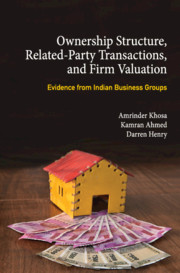 Ownership Structure, Related Party Transactions, and Firm Valuation
Ownership Structure, Related Party Transactions, and Firm Valuation Book contents
- Frontmatter
- Contents
- List of Tables
- 1 Introduction
- 2 The Evolution of Business Groups, Institutional Framework in India, and Related-Party Transactions
- 3 Theory and Literature Review
- 4 Hypotheses Development
- 5 Research Methods
- 6 Descriptive Statistics
- 7 Empirical Results
- 8 Additional Tests
- 9 Implications of the Study and Conclusion
- Appendix 1 List of Sample Firms
- Appendix 2 List of Business Groups
- References
- Index
8 - Additional Tests
Published online by Cambridge University Press: 26 April 2019
- Frontmatter
- Contents
- List of Tables
- 1 Introduction
- 2 The Evolution of Business Groups, Institutional Framework in India, and Related-Party Transactions
- 3 Theory and Literature Review
- 4 Hypotheses Development
- 5 Research Methods
- 6 Descriptive Statistics
- 7 Empirical Results
- 8 Additional Tests
- 9 Implications of the Study and Conclusion
- Appendix 1 List of Sample Firms
- Appendix 2 List of Business Groups
- References
- Index
Summary
Introduction
The previous chapter presented the main empirical findings, which suggest that the market values RPTs not only on the basis of the nature of the transaction but also considering the relationship with the party involved in the transaction and the potential incentives of controlling shareholders measured on the basis of their indirect ownership. This chapter adds to the analysis by providing additional tests controlling for firm heterogeneity using fixed-effect models. Next, to affirm the strength of the role of RPTs and indirect rights in the earnings-market valuation, the regression models are re-estimated only for firms which disclose RPTs and on individual RPTs. Alternative measures of firm size and some governance variables are then added in the model to check the robustness of the results based on different definitions for these variables. This chapter concludes with the summary of the additional test findings.
Fixed-effect model
To supplement pooled regression results, we run a fixed-effect model to address the panel structure of the sample data. First, a fixed-effect model is estimated to examine the effect of direct and indirect ownership rights on the MVE. Second, the results of this fixed-effect model estimation to examine the relationship between minority shareholder ownership and MVE are presented. Finally, the results for the market valuation of RPTs using fixed-effect model estimation are presented.
Family ownership and f irm value
Table 8.1 presents the results regarding the association between family ownership rights and MVE. Direct ownership (DIROWN) of controlling shareholders is positively associated with MVE (coef 1.594; t = 5.230), which is consistent with the pooled regression results reported in Chapter 7 Indirect ownership (INDOWN) is also positively associated with MVE (coef 1.387; t = 5.250); however, the coefficient for INDOWN is smaller than DIROWN. Overall, the fixed-effect model results are in agreement with the pooled regression model results.
Minority shareholder ownership and f irm value
Table 8.2 presents the results for the association between the ownership of minority shareholders and MVE. Consistent with the pooled regression model results, the first category of outside investors (MINORITY1) is negatively associated with MVE at 1 per cent (coef -3.272; t = -6.420). The association between the second category of outside investors (MINORITY2) and MVE is statistically insignificant.
Information
- Type
- Chapter
- Information
- Ownership Structure, Related Party Transactions, and Firm ValuationEvidence from Indian Business Groups, pp. 130 - 142Publisher: Cambridge University PressPrint publication year: 2019